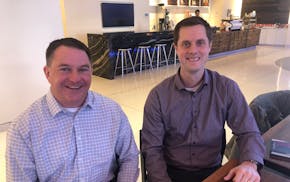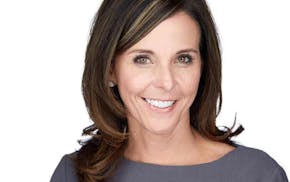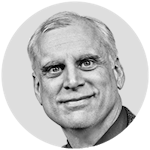Social psychologist Jonathan Haidt, a professor at New York University's Stern School of Business, makes a good case for enlightened capitalism.
"Any country that gets capitalism right will prosper," Haidt told an engaged audience recently at the 2022 Hendrickson Forum on business ethics at St. Mary's University's Minneapolis campus.
Haidt, whose TED talks on capitalism and economic-political polarity in America have been viewed more than 7 million times, documents how the freedom to create a product or service and sell at a profit has elevated most of the world from abject poverty since 1800.
Pope Francis has said "unbridled capitalism" exploits the dignity and rights of workers and is the "dung of the devil," Haidt recalled. The pope also called ethical business that provides fairly for workers and environmental stewardship "noble and a blessing."
Haidt said institutions like St. Mary's — which educates thousands of students annually, disproportionately adult learners and people of color — contribute to the good.
An example: Tony Sanneh, honored at the Hendrickson Forum for his ethical leadership. Raised by a single parent, Sanneh, 49, attended St. Paul Academy on a scholarship. He went on to earn $1 million a year playing soccer in Europe and was a star on the 2002 U.S. World Cup team.
He retired in 2010 to build his Sanneh Foundation into a force for good.
"I got up earlier to take two city buses to school from the east side," Sanneh recalled. "I remember the BMWs in that parking lot. I didn't have much. I was a poor Black kid. But being good at soccer gave me social capital. A network."
Sanneh took a couple of classes at St. Mary's after his pro soccer career to finish his college degree.
Sanneh Foundation took over a nearly shuttered Conway Community Center from St. Paul and turned it into a seven-day-a-week hub for youth sports, meals, tutoring and mentoring. The kids learn environmental sustainability — as well as communication skills.
"People think it's about soccer and sports, but it's about building that social capital," Sanneh said. "This is what I wanted to do after soccer."
Sanneh is paid about $100,000 annually to run a successful outfit that last year raised nearly $5 million in operating and capital-improvement funds. In the early years, he didn't pay himself and used his soccer savings to get the programs started. He surrounded himself with a diverse staff of coaches and mentors.
St. Mary's has responded with a program that helps some Sanneh Foundation staffers get degrees and teaching licenses. The goal is to retain and develop talented people who are paid modestly. Some want to move into education careers in jobs that can support their families, adding much-needed diversity to the teaching ranks.
These Sanneh Foundation "Dreamline" employees, about 10 enrolled at St. Mary's this year, work as education mentors with Conway Center kids. Another cohort will start this summer. They work with kids who show dramatic academic and social skills development.
"Through Saint Mary's partnership with the Sanneh Foundation, we have jointly created a licensure pathway … for these Dreamline coaches to become licensed teachers while they are serving in their Dreamline coaching roles in schools," said St. Mary's Shannon Tanghe.
Retired St. Mary's president Brother Louis DeThomasis was a successful entrepreneur before he joined his religious order. He led St. Mary's, which also has an undergraduate campus in Winona, to become one of the larger private universities in Minnesota and into its expansion to the Twin Cities and innovative, economical graduate programs.
St. Mary's was able to expand and provide scholarships thanks partly to successful capitalists, expecting no return other than the satisfaction of investing in the success of talented others in need. DeThomasis, who credits his successors with even more progress in the last 15 years, listened to Haidt and Sanneh earlier this month.
What ties St. Mary's, capitalist partners and nonprofit leaders like Sanneh together?
"It's to instill the morality and ethics and elemental dignity of the individual. Capitalism is based on individual initiative, work and trust," DeThomasis said. "A good education, and it doesn't have to be Catholic, is also about being ethical. Respecting the dignity of the person. And if you are able to take an opportunistic step forward and work with another organization, such as a nonprofit, you create a 'Wow.' A bigger, better, more ethical system.''
Capitalism that only builds more wealth for the wealthy is hollow. And drives polarization. Capitalism that spreads opportunity and wealth and rallies people creates shared enterprise and a growing economic pie in a stronger, better community.

St. Anthony: 'Patient' investing paying off for St. Paul's Hill Capital

Jennifer Smith, leader of Burnsville's Innovative Office Solutions, has died

St. Anthony: Medical professions in Minnesota need more people of color in their ranks


